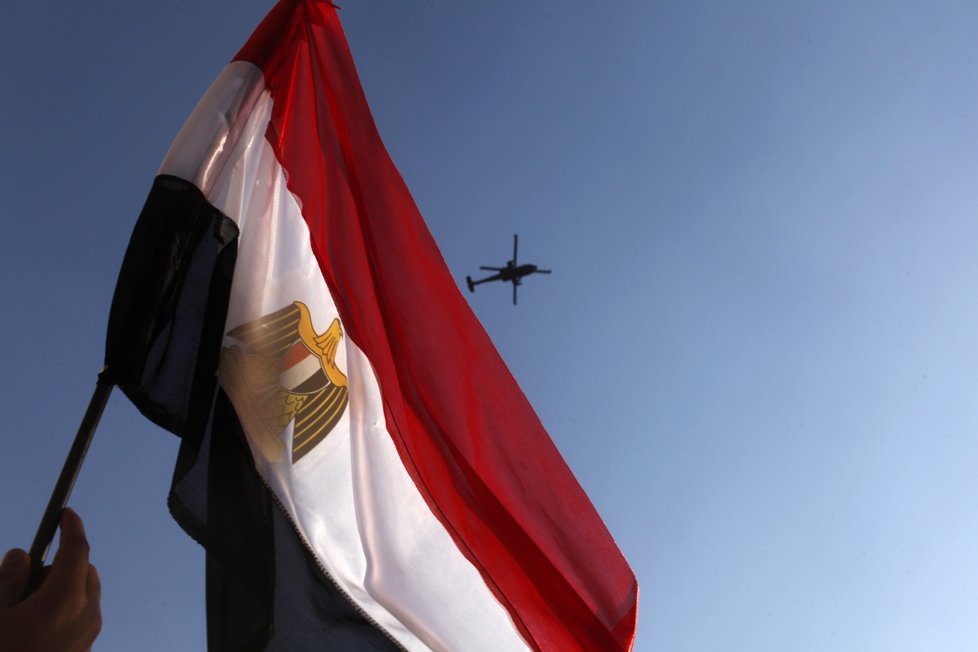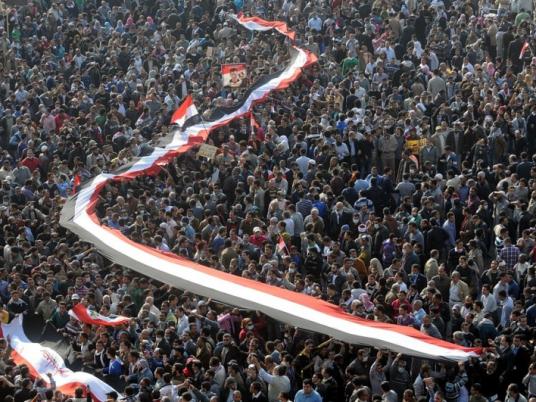A sadness, but not like death
When Emad Effat was martyred on Friday, 16 December, just before the call for sunset prayer, something began inside me that felt like death, or like the mourning for death. I didn’t think how strange it was then, nor about what it was exactly, because, after all, a man was shot, his face had become a mask, and his body was rocking on a sea of protesters like something left behind, and I had briefly, so briefly, known him.
Nor did I think it strange when I began to put my clothes on and to tell my wife, in a voice with something wrong with it, “I am going to Tahrir. If you feel you have to come with me, get dressed.”
Later, it was clearer that I had begun to see the strangeness of it when Tarek, who knew him better than me, had called, minutes after I found out, and said, “They killed him, Waleed, they killed Sheikh Emad,” and I consoled him as best I could. But at the time, it seemed only to become apparent when we finally found out where the body was and walked past the small battle on Qasr al-Aini to the hospital and through that to that quiet clearing, surrounded by that little fence, and the sad yellow lights that light downtown, where another kind of battle was raging.
The figure of a sheikh in robes and turban, head and shoulders taller than a crowd of men and women all raising their voices asking him for something, begging him, with a keen, howling sadness that seemed to tear itself from inside them. And the sheikh, whom I knew, begging them to understand that he could not give it.
As we walked toward him, he pulled away from them as though wounded and rounded a corner. We followed him and found him standing alone.
I took his hand and looked him in the eye to remind him that I knew him, a little, and saw that same keen, howling cry trying to rip itself out of him that was still filling the air from the crowd a few feet away. I knew then that I was wrong to come, that this was not my place, and that is why I used those words of condolence, which held infinite meaning in the fewest words. I covered his hand with both of mine and said, “Only God remains.”
I spent some nights in Tahrir after that, because I knew now that what I felt for Sheikh Emad and his death was not mourning, but that it shared with the mourning for death some things, and that one of those things was sadness, and I wanted to know if it was a sadness for death, or maybe something like death. I would walk along the river and turn right, and there, at the end of the road, was the wall they had built, primitive, clumsy and huge, as though to mark the end of the world, and behind it nothing but the blinding cold light of the military spotlights, as if behind it lay nothing but heaven or hell or that light they say the dying see.
As I walked toward the wall, people stood gathered here and there, almost for warmth, around some figure speaking. One of them cried out, “These martyrs — these matryrs whose blood is on the ground — are they any better than us?” And the people in the crowd would shake their heads and say, "no." And I thought, surely that can’t be right. Surely dying is the calamity, and we were privileged to live: we who felt, or did not feel, that howling cry of mourning, and they who left blood behind, for us.
But then, as I sat on the ground and leaned my back against the wall, I thought of that man with the mustache, and the blood on his shirt, who told me last February, for no reason I could see, and with a look of grief in his eye, “This blood is not mine. It belongs to the guy who was standing behind me. The officer holding the rifle was on the street below me, and I was on the bridge. I saw him just as he raised the rifle and I stepped out of the way. The bullet hit him right in the chest. I turned to pick him up, to help him, but he was dead, you see?” I nodded, because I did see, but then the man relaxed as though he had been anxious that I wouldn’t see at all, and with that easing up, he presented me with the real thing he wanted to say about that man who got shot. “Lucky bastard,” he said. “Must just have been a better man than me.” And something other than mourning had come into his eye.
I knew what he meant of course, but I had a bitter thought then. Maybe he’s right, I thought, and gathered my coat around me in the cold. The sadness was for death, and the dying felt that, and their families and their friends. And perhaps that other thing, that other thing that came into his eye, was only a thing that the living felt, when others died and not themselves. And I would have sat there, thinking bitter thoughts in the cold at the bottom of the wall had it not been for that story that Mahmoud Samy of the April 6 Youth Movement had told us. Before telling the story, Mahmoud said to Moataz and me that it was God who chose martyrs, and that He would never pick one of us. “Why?” We asked him. “Because,” he answered, “we’re sons of bitches.”
And then he told us the story of that boy he was standing next to, on the same bridge, on a different night, when after the Battle of the Camel, and near dawn, he had joined those who slipped past the barricade the protesters had set up. They had attacked the bridge from which the police and thugs were firing. “He was two centimeters in front of me and to the side, and then a wound appeared in his back, near his kidney. There was no sound, it just appeared, and then he cried out as he was running, and fell. We picked him up, me and another man, to carry him to the field hospital. He died before we got there. On the way, when I looked down at him he was smiling. The man who was carrying him with me yelled out to clear the way, 'Out of the way, boys! A martyr is coming!' I yelled at him to be quiet, and looked down at the boy we were carrying to see if he had heard. He was laughing.”
There was a silence after he told that story. And now, at the bottom of the wall, there was another silence, and it was filled with Sheikh Emad. I remembered his wife on television, saying, “When Emad went on pilgrimage this year, he asked for martyrdom, and when I asked him about it he said, ‘God willing, it will be this year, and in Tahrir.’” No, I thought. Those who go, go their own way, laughing. On this side, at the foot of the wall, lie the mourning and its sadness, and that other sadness that isn’t tied to mourning but may be tied to death, all that exists for us.
Nor did I find out that night if it was tied only to death, but the next night I saw a child, homeless, perhaps 11 years old, in torn clothing, barefoot and filthy, sitting on the shoulders of a man, chanting slogans and throwing his fists in the air. He was shouting at Field Marshal Hussein Tantawi that he wasn't afraid, and then, because he was shouting as hard as he could, his voice broke, and he faltered and then he was yelling in a broken voice with all the strength left in his birdlike body, his voice no louder than a whisper until I wanted to beg him to stop. I felt something in me soften, sadden, and with the saddening I wanted to cover him with my coat. And the thing inside me I had for Sheikh Emad was there, and the same sadness that came with it, and which I now knew I had for that little boy also. It grew until I walked to the pavement and sat down.
Later, when he was sitting on the same pavement with his head bowed, I walked up to him. My shadow covered his body, and he looked up at me towering above him. “What the hell are you doing here?” I asked him. He answered, his voice still a hoarse whisper, “I want Tantawi to go away.” “Why?” I said. He sounded tired, and he said in a tired monotone, “Because he is unjust and the people are being exploited, and the revolution was triggered the middle classes but is only going to be continued by people of the lower classes like us.” I pressed my lips together to keep from laughing. I even managed to keep myself from asking which political movement had taught him those words. It didn’t matter anyway, there were many of these movements in the square, and many boys who felt they understood more than the others. What mattered was now, when I thought of Sheikh Emad, as when I looked at that little frail bird of a boy, the sadness that came to me came with a smile.
Nearer to dawn, I met another little boy, sitting on the fence. He came to listen to us talk around the fire. I was tired and I had a pain in my back. I was asking the men around me when the hell the Supreme Council of the Armed Forces was going to leave so I could go lie down. The boy was watching me, chubby, barefoot and dirty; he was knocking with a stick against the fence he was sitting on, over the fire. Halfway through my rant, he tilted his chin toward me and spoke. “Hey,” he said. I stopped. “Yes?” I said. “You want the council to leave?” I said I did. “Wait,” he told me. We all waited, but he looked at us, with total confidence, and continued to tap his stick against the fence. After a while, I said, “Wait?” “Yeah,” the boy told me, “Wait. Make a decision and then wait. Wait long enough and one day you’ll turn around and find them gone.” A long moment passed. I turned around to the man standing next to me. “This boy is a political prodigy,” I said and the man smiled. The boy nodded regally in acknowledgment. Then a thing happened that brought back the sadness of Sheikh Emad.
“I … I just have a question,” the boy said in a low voice. He pressed his lips together like the small boy that he was, and looked down at his feet. “What exactly is the Supreme Council of the Armed Forces?” As the laughter started, I smiled and softened for the third time that night. When the laughter died down, I took a step toward him. “It’s like this,” I started. As I explained to him, as best I could, what SCAF was, and why it needs to go. I thought about what one of Sheikh Emad’s relatives said when asked why Sheikh Emad was in the square: “He was there because he couldn’t bear to see anyone suffer.” I think that what’s inside me right now for this boy. It is what was inside Sheikh Emad until the moment he died, and this is what’s inside me also for Sheikh Emad. But I don’t know. What I do know is this: that it is a sadness, but not like death.
Waleed Almusharaf is a PhD student at the School of Oriental and African Studies.
This is the first section of a longer piece that was originally published on mondoweiss. Two more sections of this piece will be published on Egypt Independent in the coming weeks.




